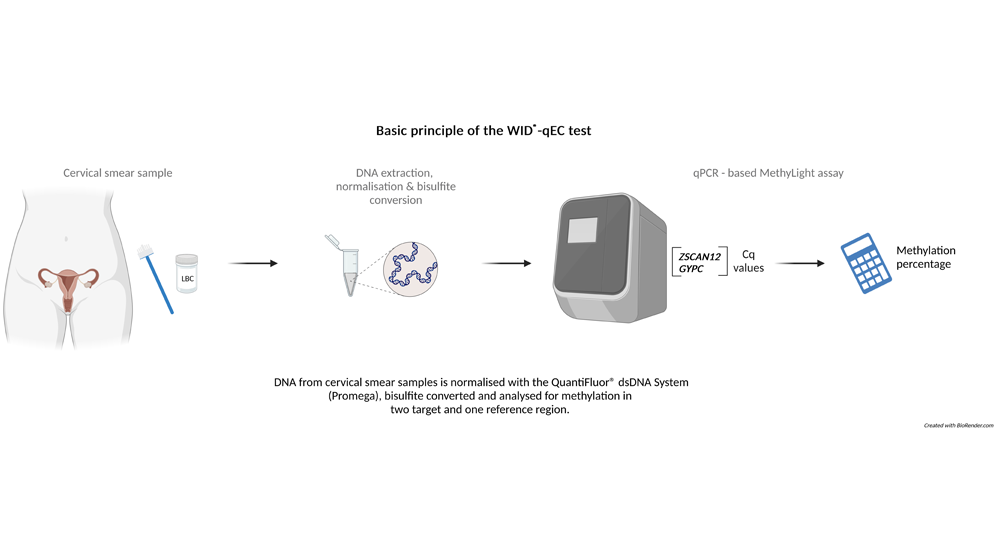Lena Schreiberhuber
EUTOPS institute, University of Innsbruck
Epigenetics & cancer
Help me to win the Young Researcher
Award 2023 from Promega.
Why should you vote for me!
I feel that votes from the public would endorse the fact that we have succeeded in relaying our scientific concepts in an understandable format indicating continued support for gynaecological cancer research in the future.
Abstract
Endometrial cancer (EC) is the most common gynaecological cancer in developed countries. Abnormal uterine bleeding (AUB) is the primary symptom of these malignancies. Contingent on menopausal status, only 1.2-9% of all patients with AUB are eventually diagnosed with EC. Clinical guidelines recommend operator-dependent assessment strategies, e.g., ultrasound, to triage women for invasive histological procedures. An objective, accurate, and non-invasive method for the detection of EC is urgently required.

Previously, we developed and validated the WID®-qEC test, a DNA-based, methylation-specific quantitative real-time PCR assay. DNA from cervical smear samples is normalised with the QuantiFluor® dsDNA System (Promega), bisulfite converted and analysed for methylation in two target and one reference region. In various clinical settings, the WID®-qEC test outperforms established techniques to detect EC. Additionally, the test accurately identifies invasive cervical cancer in women with AUB. Notably, our data indicate that the WID®-qEC test is applicable for health-care-professional-, and self-collected samples. To demonstrate highest compliance with European standards for clinical assays, CE-IVDR certification and external validation embody the forthcoming steps with which to implement the test in the diagnostic pathway for uterine cancer detection.
Overall, the WID®-qEC test may possess the potential to offer a new, fast, and objective method facilitating the triage of women with AUB and at risk of uterine cancers, thereby outperforming existing detection tools.
Reference
Herzog C, Marin F, Jones A, et al. A Simple Cervicovaginal Epigenetic Test for
Screening and Rapid Triage of Women With Suspected Endometrial Cancer: Validation in
Several Cohort and Case/Control Sets. J Clin Oncol 2022; 40(33): 3828-38. doi: 10.1200/JCO.22.00266
Schreiberhuber, L, Herzog, C, Vavourakis, CD, et al. The WID-qEC test: Performance in a hospital-based cohort and feasibility to detect endometrial and cervical cancers. Int J Cancer. 2023; 152(6): 1269 - 1274. doi:10.1002/ijc.34275
Describe the activity of your laboratory in a few lines:
The EUTOPS Institute in Zams was founded in 2020 and is led by Prof. Martin Widschwendter. Our international team focuses on developing new prevention and screening strategies in the field of oncology by taking a translational research approach. Representing one of our core disciplines, DNA-methylation-related concepts mainly form the basis of our scientific work. Conducting large-scale clinical studies, such as TirolGESUND and LIFE & SUN Tirol, reflect the expertise of our research group, we aim to learn more about disease-risk prediction and prevention, as well as age-related biological signatures.

What are your other interests outside of science?
Born in Austria, I naturally love to hike our beautiful Alps (or actually any other mountain out there). During winter season, hiking gets replaced by skiing or ski mountaineering. While I also enjoy visiting foreign countries, sometimes staying at home, meeting friends and having a good cup of coffee can be fulfilling too.
Tell us something about your scientific background :
I initially studied biology at the University of Vienna and quickly became fascinated by genetics and molecular biology. During my undergraduate studies, I gained basic hands-on experience in various Austrian laboratories. Continuing my Master’s degree in molecular medicine, I was able to explore the world of signal-transduction using in-vivo models or molecular techniques, such as CRISPR-tools. An ERASMUS+-funded internship abroad has ultimately convinced me to further broaden my scientific horizons by embarking on a PhD in the epigenetic cancer research field.
Can you describe yourself in 3 adjectives?
Curious, open-minded, organized
If you were a famous scientist, who would you be?
Rosalind Franklin: In general, I must admit that I am in awe of all female role models who’ve shaken up our world with bright ideas, new concepts or impactful findings. Yet, having shed light onto one of the key ‚ingredients‘ for life (i.e., DNA), despite not being honoured accordingly simply due to her gender, Rosalind Franklin might be the scientist, I would select. It is the very fact that she continued her research with limited resources despite this lack of acknowledgment that I find compelling and suggestive of an adventurous spirit. It would be interesting to know whether she realized just how ground-breaking her scientific contributions were.